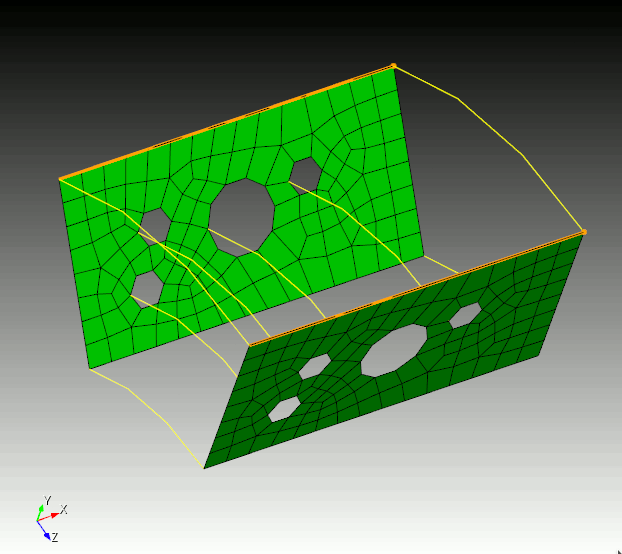Cubit 16.10 User Documentation
Applies to: Curves, Surfaces, Volumes
Summary: Copies the mesh from one entity to another
Syntax:
Curve <range> Scheme Copy source Curve <range> [Source Percent [<percentage> | auto]] [Source [combine|SEPARATE]] [Target [combine|SEPARATE]] [Source Vertex <id_range>] [Target Vertex <id_range>]]
Surface <id> Scheme Copy Source Surface <id> Source Curve <id> Target Curve <id> Source Vertex <id> Target Vertex <id> [Nosmoothing] [mirror]
Volume <range> Scheme Copy [Source Volume] <id> [[Source Surface <id> Target Surface <id>] [Source Curve <id> Target Curve <id>] [Source Vertex <id> Target Vertex <id>]][Nosmoothing]
Copy Mesh Curve <id> Onto Curve <curve_id_range> [Source Node <starting node id> <ending node id>] [Source Percent [<percentage>|auto]] [Source Vertex <id_range>] [Target Vertex <id_range>]
Copy Mesh Surface <surface_id> Onto Surface <surface_id> Source Vertex <id> Target Vertex <id> Source Curve <id> Target Curve <id> [interior (pair vertex <id> <id>) ...] [smooth] [mirror] [preview]
Copy Mesh Volume <volume_id> Onto Volume <volume_id> [Source Vertex <vertex_id> Target Vertex <vertex_id> [Source Curve <curve_id> Target Curve <curve_id>] [Nosmoothing]
Related Commands:
Set Morph Smooth {on | off}
Discussion:
If the user desires to copy the mesh from a surface, volume, curve, or set of curves that has already been meshed, the copy mesh scheme can be used. Note that this scheme can be set before the source entity has been meshed; the source entity will be meshed automatically, if necessary, before the mesh is copied to the target entity. The user has the option of providing orientation data to specify how to orient the source mesh on the target entity. For example, when copying a curve mesh, the user can specify which vertex on the source (the source vertex) gets copied to which vertex on the target (the target vertex). If you need to reference mesh entities for the copy, use the Copy Mesh commands. If no orientation data is specified, or if the data is insufficient to completely determine the orientation on the target entity, the copy algorithm will attempt to determine the remaining orientation data automatically. If conflicting, or inappropriate, orientation data is given, the algorithm attempts to discard enough information to arrive at a proper mesh orientation.
Curve mesh copying has certain options that allow the copying of just a section of the source curves' mesh. These options are accessed through the extra keyword options. The percent option allows the user to specify that a certain percentage of the source mesh be copied--in this context the auto keyword means that the percentage will be calculated based on the ratio of lengths of the source and target curves. The combine and separate keywords relate to how the command line options are interpreted. If the user wishes to specify a group of target curves that will each receive an identical copy of a source mesh, then the target separate option should be used (this is the default). If, however, the user wishes the source mesh to be spread out along the range of target curves, then the target combine option should be used. The source curves are treated in a similar fashion.
Surface mesh copying with multiple holes in the surface may require matching up interior pair vertices. This will be required if the algorithm cannot match them up spatially. Interior pair vertices can be specified with the option Interior pair vertex <id> <id> ...
Volume mesh copying depends on the surface copying scheme. Because of this, the target volume must not have any of its surfaces meshed already.
An exact copy of the mesh may not always happen. Dissimilar geometry or smoothing may cause inexact copies. If the geometry is similar, the smoothing option may be turned off to get an exact copy of the mesh, by either specifying Nosmoothing or by omitting Smooth. If the geometry is dissimilar, the user may set the morph smoothing flag on, which will activate a special smoother that will match up the meshes as closely as possible.
Example:
As an example, the following copy is done with the command
copy mesh surf 23 onto surf 14 source curve 1 source vertex 1 target curve 24 target vertex 20
The source and target vertices match up, and are highlighted, while the source and target curves match up and are highlighted. Matching the source and target curves/vertices help define the orientation.
